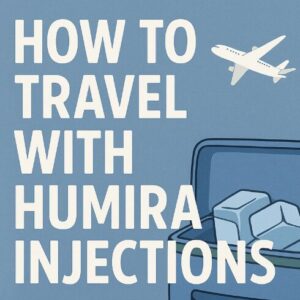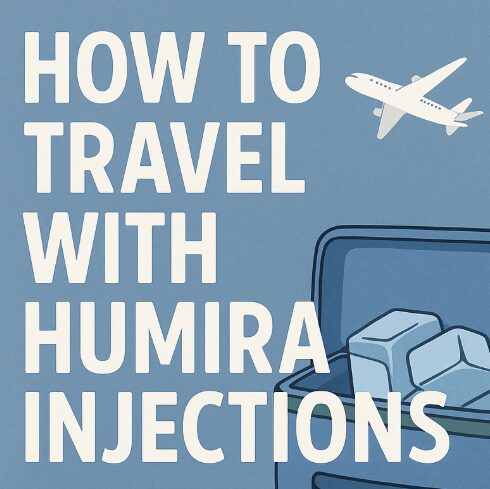If you’re living with a chronic condition that requires biologic medications like Humira (adalimumab), international travel can seem stressful. Humira must be kept within a specific temperature range—typically between 36°F and 46°F (2°C to 8°C)—which presents a unique challenge on long flights or layovers. But with the right preparation and tools, you can absolutely travel safely with your medication.
In this guide, you’ll find practical advice from patients, frequent flyers, and healthcare providers to ensure your Humira stays cold and safe from check-in to your final destination.

Understand Airline and TSA Rules First
Before packing your medication, make sure you understand the current policies around medical liquids and prescription drugs:
Humira is allowed in carry-on bags. Never pack it in checked luggage where it may freeze or be lost.
TSA permits ice packs and insulated bags as long as the medication is clearly labeled and declared during security checks.
Prescription label must be visible. Either the box or your pharmacy-issued label should include your name and the drug.
It’s a good idea to carry a doctor’s letter explaining your condition and the need for refrigerated medication, especially for international travel. You can show this at customs or security if asked.
Use a Medical-Grade Travel Cooler
Standard lunch coolers won’t reliably keep medications cold for 10+ hours. Invest in a medical-grade travel cooler designed specifically for temperature-sensitive biologics.
Some trusted brands include:
Frio wallets (activated by water, better for shorter flights)
MedActiv iCool Medicube or DisonCare Coolers (better for international travel)
Vivi Cap or TempraMed smart caps (insulated vial carriers for shorter journeys)
Look for features like:
Long cooling duration (20+ hours)
TSA approval or medical certification
Built-in thermometer or temp display
Don’t forget to test your cooler setup a few days before flying. Monitor temperatures with a digital thermometer to ensure it stays within the safe zone.
How to Pack Your Humira Safely
Here’s a simple packing checklist:
Medication in original box or labeled prescription container
Travel cooler with frozen gel packs or cooling elements
Doctor’s letter and prescription copy
Extra medication if possible, in case of delays
Insulated zip bag or pouch for transfer if needed
Place the cooler in your carry-on backpack or personal item, not the overhead bin. Humira doesn’t tolerate freezing, so keep it away from direct contact with ice packs unless properly insulated.
What to Do During Long Layovers or Delays
If you’re facing a 15-hour flight with a layover, temperature stability becomes even more critical. Here’s what to do:
Use hotel minibars for overnight cooling during stopovers
Avoid opening the cooler frequently
Notify airport staff if your layover is extended and you need access to refrigeration (some airports have medical fridges)
Bring a thermometer inside the cooler to track any fluctuations
Some travelers bring a small USB-rechargeable thermometer with alarms to notify them if the temperature drops too low or climbs too high.
Can You Bring Extra Humira?
Travelers often wonder if they can bring more than one syringe or pen. The answer is yes, but plan ahead:
Request a travel-sized prescription from your doctor
Carry a copy of the prescription on paper or email
If flying internationally, check import regulations for medication in the country you’re visiting
You should also check with your airline if there’s a limit on how many syringes or auto-injectors you can carry. In most cases, there isn’t—as long as it’s medically necessary.
Tips from Frequent Flyers with Humira
Here are tips gathered from Reddit users and global travelers who regularly fly with Humira:
“I pack mine in a DisonCare cooler with 2 ice bricks and it stayed cold for 24 hours.”
“I always carry a printed copy of my prescription. Saved me from issues at EU customs.”
“If you’re unsure about temperature, bring a digital reader. Saved my meds once during a flight delay.”
If you want to read more experiences, you can explore community insights by searching Reddit’s Humira travel tips or health forums.
What to Do If Your Medication Gets Too Warm
If you suspect your Humira exceeded safe temperatures:
Check the temperature history (if you have a monitor)
Contact your pharmacy or AbbVie support line
Don’t inject until you get confirmation that it’s still usable
Humira is expensive, and it’s not worth taking a risk. Always verify with a healthcare provider.
Helpful Links and Tools for Planning Ahead
Learn more about TSA’s rules for medical travel here
Explore AbbVie’s travel guide for Humira patients by contacting their patient support line
Browse medical travel coolers recommended by patients on this helpful Amazon roundup
With thoughtful planning and the right equipment, traveling with Humira becomes not just doable, but stress-free. Whether you’re heading abroad for work, vacation, or visiting family, don’t let your medication hold you back from exploring the world safely and confidently.
